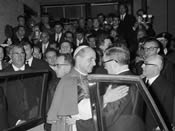Edith Stein “saw” with her intellect (after having read the autobiography of St. Teresa of Avila) and converted from Judaism to Christianity. As “Teresia Benedicta ac Cruce” (Teresa Blessed of the Cross), a Discalced Carmelite nun, she died a martyr in a gas chamber of the Nazi concentration camp at Auschwitz (Poland) on 9 August 1942. She is still remembered as the brilliant writer and teacher of philosophy who had been an assistant and collaborator of Edmund Husserl (the “father” of Phenomenology). Pope John Paul II beatified Sister Teresa Benedicta of the Cross on 1 May 1987, and canonized her on 11 October 1998.
St. Teresa Benedicta of the Cross evokes the importance of the human intellect, of reason, in bringing the person to his last end, union with God. This is the theme of the Encyclical Fides et Ratio (1998) of Pope John Paul II:
“Faith and reason are like two wings on which the human spirit rises to the contemplation of truth; and God has placed in the human heart a desire to know the truth—in a word, to know himself—so that, by knowing and loving God, men and women may also come to the fullness of truth about themselves (cf. Ex 33:18; Ps 27:8-9; 63:2-3; Jn 14:8; 1 Jn 3:2).” (FeR, Preamble)
X x x x
“‘All human beings desire to know’, and truth is the proper object of this desire. Everyday life shows how concerned each of us is to discover for ourselves, beyond mere opinions, how things really are. Within visible creation, man is the only creature who not only is capable of knowing but who knows that he knows, and is therefore interested in the real truth of what he perceives. People cannot be genuinely indifferent to the question of whether what they know is true or not. If they discover that it is false, they reject it; but if they can establish its truth, they feel themselves rewarded. It is this that Saint Augustine teaches when he writes: ‘I have met many who wanted to deceive, but none who wanted to be deceived’. It is rightly claimed that persons have reached adulthood when they can distinguish independently between truth and falsehood, making up their own minds about the objective reality of things. This is what has driven so many enquiries, especially in the scientific field, which in recent centuries have produced important results, leading to genuine progress for all humanity.” (No. 25)
X x x x
“Just as grace builds on nature and brings it to fulfilment, so faith builds upon and perfects reason. Illumined by faith, reason is set free from the fragility and limitations deriving from the disobedience of sin and finds the strength required to rise to the knowledge of the Triune God. Although he made much of the supernatural character of faith, the Angelic Doctor did not overlook the importance of its reasonableness; indeed he was able to plumb the depths and explain the meaning of this reasonableness. Faith is in a sense an “exercise of thought”; and human reason is neither annulled nor debased in assenting to the contents of faith, which are in any case attained by way of free and informed choice.” (No. 43)
X x x x
“Deprived of what Revelation offers, reason has taken side-tracks which expose it to the danger of losing sight of its final goal. Deprived of reason, faith has stressed feeling and experience, and so run the risk of no longer being a universal proposition. It is an illusion to think that faith, tied to weak reasoning, might be more penetrating; on the contrary, faith then runs the grave risk of withering into myth or superstition. By the same token, reason which is unrelated to an adult faith is not prompted to turn its gaze to the newness and radicality of being.” (FeR, No. 48)
It cannot be by “faith alone” that man would reach his eternal happiness. Apart from the issue of the protestant dichotomy of “faith and works”, Faith seeks “understanding”. We are, after all, men, not angels, and it is of our human nature (even our “authentic” nature, not only our “wounded” nature) to “understand” the “truth” with our human intelligence, just as it is of our authentic human nature to “love” the “good” with our human freedom.
“Faith”, the supernatural virtue of believing God’s revelation, is “infused” by grace; but the truths contained by that Faith call for an understanding that is dynamic--that is, increasing in the degree of apprehension--if they are to penetrate more and more into our human personality. The disciples would ask our Lord, “Explain to us the parable,” Dissere nobis parabolam (Mt 13:36).
St. Josemaria writes: “'Follow me, and I will make you into fishers of men'. Not without reason does our Lord use these words: men — like fish — have to be caught by the head. What evangelical depth there is in the 'intellectual apostolate'!” (The Way, No. 978)
O.C.P.A.J.P.M.









No comments:
Post a Comment